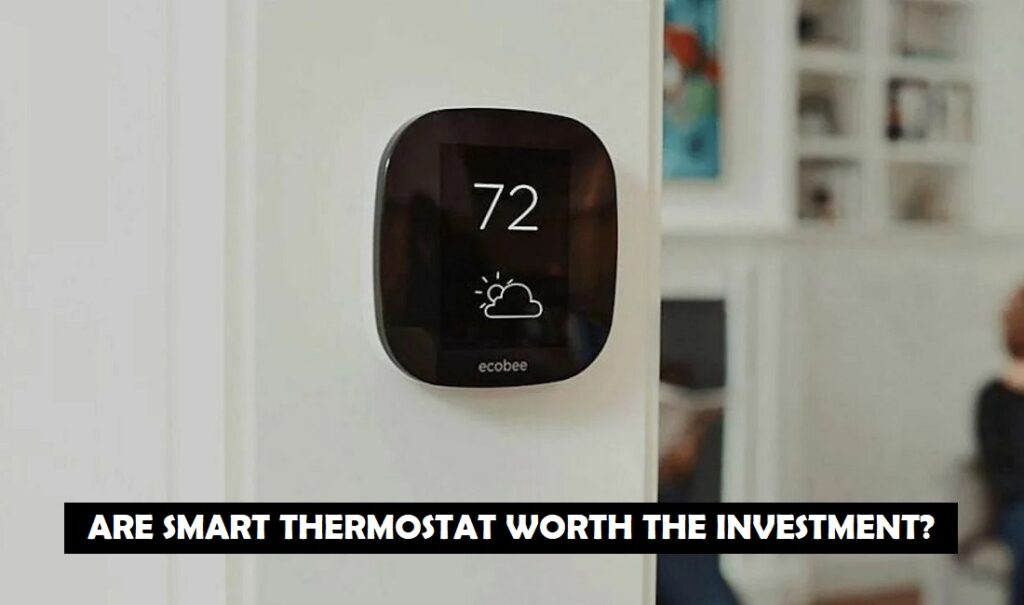In an era where technology is integrated into nearly every aspect of our lives, smart thermostats have emerged as a promising addition to modern homes. These innovative devices claim to enhance comfort, reduce energy consumption, and offer greater control over heating and cooling systems. But the question remains: Are smart thermostats truly worth the investment? In this article, we’ll delve into the world of smart thermostats, examining their features, benefits, and potential drawbacks to help you make an informed decision.

Understanding Smart Thermostats
What Are Smart Thermostats?
Smart thermostats are advanced climate control devices designed to replace traditional thermostats. They are equipped with sensors, Wi-Fi connectivity, and intelligent algorithms, allowing them to adapt to your preferences and optimize heating and cooling operations automatically.
Key Features
Smart thermostats offer a range of features, including:
1. Remote Accessibility
One of the standout advantages of smart thermostats is the ability to control your HVAC system remotely. Through smartphone apps or web interfaces, you can adjust the temperature, schedule settings, and monitor energy usage from anywhere in the world.
2. Learning Capabilities
Many smart thermostats are equipped with machine-learning algorithms that analyze your behavior and adapt heating and cooling schedules accordingly. Over time, they can create energy-efficient routines tailored to your lifestyle.
3. Energy Savings
The promise of energy savings is a major selling point for smart thermostats. By optimizing heating and cooling, these devices aim to reduce energy consumption and lower utility bills.
4. Integration with Smart Home Systems
Smart thermostats can seamlessly integrate with other smart home devices, such as voice assistants (e.g., Alexa or Google Assistant) and smart lighting systems. This integration enhances overall home automation.
The Pros of Smart Thermostats
1. Enhanced Energy Efficiency
Smart thermostats can optimize your HVAC system’s performance, leading to significant energy savings. By learning your preferences and adjusting temperature settings accordingly, they prevent unnecessary heating or cooling.
2. Remote Control and Monitoring
The ability to control your thermostat remotely offers convenience and flexibility. Whether you’re at work, on vacation, or simply lounging on the couch, you can make real-time adjustments to maintain comfort.
3. Learning and Adaptation
Smart thermostats take the guesswork out of setting temperature schedules. They learn from your behavior and make adjustments to ensure optimal comfort and energy efficiency.
4. Integration with Smart Ecosystems
Smart thermostats can be integrated into your existing smart home ecosystem, allowing you to create a cohesive and interconnected living environment.
The Cons of Smart Thermostats
1. High Initial Cost
One of the primary drawbacks of smart thermostats is their initial cost. They tend to be more expensive than traditional thermostats, which can deter some homeowners.
2. Compatibility Issues
Not all HVAC systems are compatible with smart thermostats. Before purchasing one, you should ensure that your system supports the device’s features.
3. Learning Curve
While smart thermostats aim to simplify temperature control, some users may find the initial setup and learning curve challenging.
4. Data Privacy Concerns
The data collected by smart thermostats may raise privacy concerns for some individuals. It’s important to review the manufacturer’s data usage policy and security measures.
Are Smart Thermostats Worth the Investment?
The decision to invest in a smart thermostat ultimately depends on your priorities and budget. If you value energy efficiency, convenience, and the ability to customize your home’s climate remotely, a smart thermostat may be a worthwhile investment. However, if the initial cost is a significant concern, and you have a simple HVAC system that doesn’t require advanced features, a traditional thermostat may suffice.
In conclusion, smart thermostats have the potential to enhance your home’s comfort and reduce energy consumption. They offer remote control, learning capabilities, and integration with smart home systems. Nevertheless, it’s essential to weigh the pros and cons, considering factors such as cost and compatibility, before making your decision.




